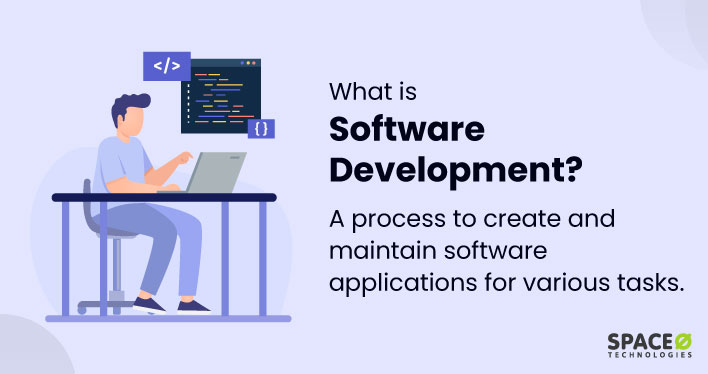Table of Contents
What is Software Development?
Software development is a structured process of designing, coding, testing and maintaining software applications that run on various platforms and devices.
The process involves a series of actions that utilize programming languages and algorithms, guided by principles of software engineering, to address specific problems or perform designated tasks.
At its core, software development is about managing various elements, such as code, algorithms, and user interfaces, to enhance the ease of task implementation and improve programming efficiency. This leads to the creation of user-friendly applications that can streamline business operations and drive innovation across various industries.
The systematic process involved in developing and managing a software application is called the software development life cycle. Check out the steps involved in the software development process.
Software Development Process in 7 Steps
- Decide Project Scope: The development team decides the project’s scope, objectives, timeframe, resources, budget, and risks in the first stage, laying the foundation for the project and aligning everyone on the project’s direction.
- Conduct Requirement Analysis: The team conducts requirements analysis in collaboration with clients to determine user needs, functions, and system constraints, ensuring an extensive understanding of the software’s objectives.
- Create UI/UX Design: The design process includes developing the software’s architecture, structure, and user interfaces, as well as prototyping to improve the software’s appearance and usefulness based on user feedback.
- Write a Code: Designers produce program code based on design criteria and needs, and they frequently employ collaboration and version control tools for effective management.
- Perform QA Tests: Quality assurance teams run a variety of tests, including functional, integration, performance, and user acceptance testing, to detect and resolve issues and ensure the software fulfills defined criteria and performs appropriately.
- Deploy Software: After testing and bug corrections, the software must be deployed to make it available to users, whether by installing it on servers, using cloud platforms, or distributing it through app stores.
- Maintain Software: To ensure long-term relevance and competitiveness, continuing software maintenance includes monitoring, problem resolution, speed optimization, and regular updates for new features.
Now you have an idea about the steps involved in software development, so let’s learn the types of software development.
4 Types of Software Development
System Software Development
System software development focuses on creating operating systems, such as Windows, Linux, and macOS, which are designed to run on computers or devices. This category also includes utility programs, such as device drivers and system libraries. These utilities manage computer hardware and provide the foundational environment in which application software operates.
For example,
Microsoft’s creation of the Windows operating system. It’s an operating system that runs applications, manages file systems, provides device drivers, among many other fundamental tasks that make a computer hardware work.
Application Software Development
Application software development refers to developing software programs or applications that are designed to execute certain tasks or services for end users. Examples: Word processors, spreadsheet apps, online browsers, and games.
For example,
The creation of Adobe Photoshop. Adobe Photoshop is an image editing and graphic design software which enables users to manage and enhance digital photos and artwork.
Programming Software Development
Software development is the set of tools and environments developers use to build, debug, and manage software applications. As part of the development of the programming software, an IDE, code editor, compiler, and debugging tools are needed.
For example,
Visual Studio Code : VS Code is one of the most popular code editor used among developers to code fast, debug fast and manage fast. This editor is free, built on open source, and runs everywhere. It comes with built-in support for JavaScript, TypeScript and Node.js and has a rich ecosystem of extensions for other languages and runtimes (such as C++, C#, Java, Python, PHP, Go, .NET).
Embedded Software Development
Embedded software development is specifically carried out to run on embedded systems, which are specialized computer systems integrated into other devices or goods, such as microcontrollers in appliances, automobile control systems, or Internet of Things devices. To operate and maintain the hardware of these embedded systems, embedded software is developed.
For example,
Firmware development for a smart home thermostat. Embedded software is used to operate the thermostat: temperature regulation and communication with a home automation system.
Once familiar with the different types of software development, read on to learn the value of software development in the next section.
What is the Importance of Software Development?
Software development is not about typing lines of code, it is an art and science of creating tools and solutions in the digital space. To better assist you in understanding software development, read on below.
Empowers Businesses and Industries with Custom Solutions
Software development is beneficial for the businesses to create custom solutions that make your operations smooth and efficient. Software helps businesses continue to meet the needs of our ever-evolving world, from managing money, tracking goods and interacting with customers.
Enhances User Experiences through User-Friendly Software
Think about some of your favorite apps or websites. Their seamless functionality is the outcome of software development. Well-designed software ensures user-friendly experiences, simplifying tasks such as online shopping, communicating with friends, or ordering food.
Drives Innovation in Today’s World
Software developers are the inventors of our world today. It includes tech savvy individuals who design and invent smart devices, virtual reality, and artificial intelligence. From self-driving cars to tailored healthcare, these innovations are changing the way we live and work.
Saves Time and Money with Automated Processes
Consider a world where software automation does not exist. Many of the tasks would still be completed manually. By automating repetitive tasks like payroll processing and data analysis, the software saves us time and money.
Expands Access to Information Globally
The internet, which is powered by software, has made easier the availability of information. This connects people all around the world, providing educational materials, news, and opportunities that were previously unavailable.
Ensures Security with Robust Cybersecurity
Building digital bodyguards is equivalent to software development. This develops products that protect your internet data from viruses and hackers. These software solutions serve as digital defenders, guarding us against cyber threats such as viruses, malware, phishing assaults, and data breaches.
Enables Growth with Scalable Solutions
Scalable software enables businesses to grow and adapt, allowing businesses to incorporate additional users and new features as they evolve and thrive. This adaptability guarantees that as a company grows.
Software development creates specialized tools to help businesses run more efficiently. Whether it’s managing costs, controlling inventory, or communicating with customers, software makes everything go smoothly.
The software helps save valuable time and resources by automating repetitive tasks and keeps your internet data safe from exposure. This also connects people all over the world and helps businesses in growing and changing.
For businesses looking for custom software development firm, our holistic approach and tech expertise will deliver efficient and cost-effective software solutions.





